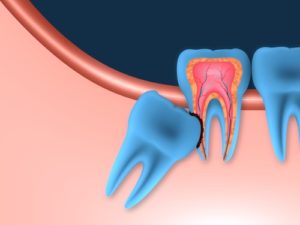Wisdom Teeth and Teens: What Every Parent Should Know
Like dental braces, the removal of wisdom teeth is one of the dental “rites of passage” for teens.
Wisdom teeth — or third molars — are our final set of molars and usually start to emerge between the ages of 16 and 25. They are known as “wisdom” teeth in most cultures because of their late arrival compared to other adult molars.
If your teen begins to complain about wisdom teeth symptoms, including inflammation and wisdom teeth pain towards the back of their jaw, it is very likely that their wisd
om teeth are getting ready to erupt. Once the teeth break through the gums it is important for your teen to clean them thoroughly everyday, since food and debris can easily become trapped under the gums and cause painful swelling and infection.
Your teen’s dentist will monitor the development of their wisdom teeth by taking X-rays periodically to track their position and movement. If the teeth become impacted — which means that they are coming in at an angle — you will probably be referred to an oral surgeon to have the teeth removed. Impacted wisdom teeth can become infected, cause cysts and damage nearby teeth and nerves, so they should be removed as soon as possible.
Will Your Teen Need Wisdom Teeth Removed?
Sometimes wisdom teeth are unable to erupt because there is not enough room in your teen’s jaw. They may become stuck before they reach the gum surface or while the crown of the tooth is partially visible. This can lead to infections and other complications, so your dentist will likely suggest that they are removed.
Some dentists will suggest removing your teen’s wisdom teeth as a preventive measure if it is likely that they will cause dental problems down the road. This is often done long before the tooth emerges because the longer a wisdom tooth remains in the mouth the more developed its root becomes. As a result, oral surgery may take longer and complications can occur.
Most dentists agree that removing wisdom teeth is the best way to prevent tooth decay, gum infection and pressure pain. Since wisdom teeth will try to make room for themselves in your teen’s tightly packed jaw, they may also shift teeth that have been previously straightened with braces or other orthodontic devices, ruining the investment you made in your orthodontist.
If you have not done so already, it is a good idea to speak with your teen’s dentist about their wisdom teeth. Waiting until complications arise can make the removal process more difficult, and a dentist is the best person to advise you about treatment options.
Leave a reply










